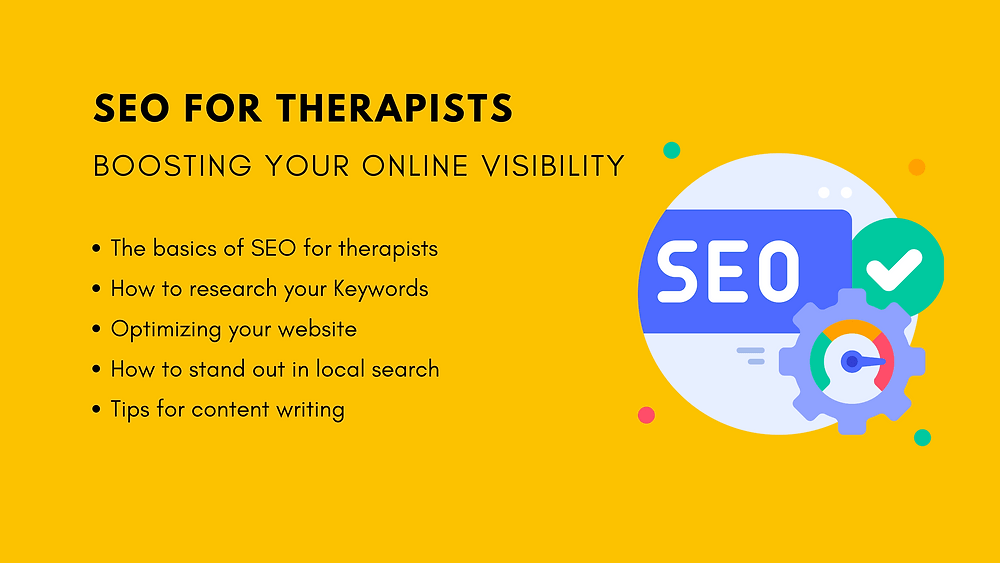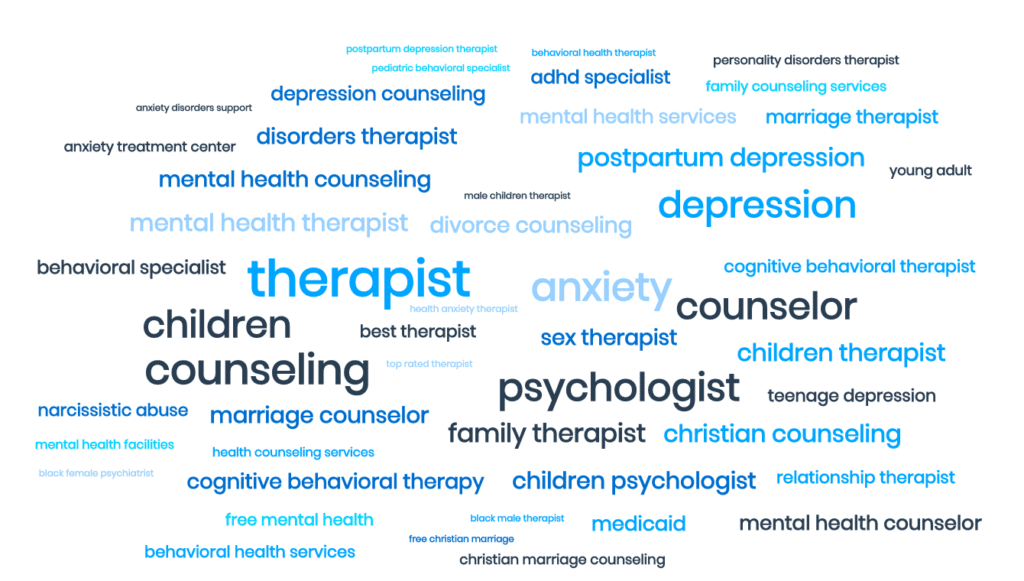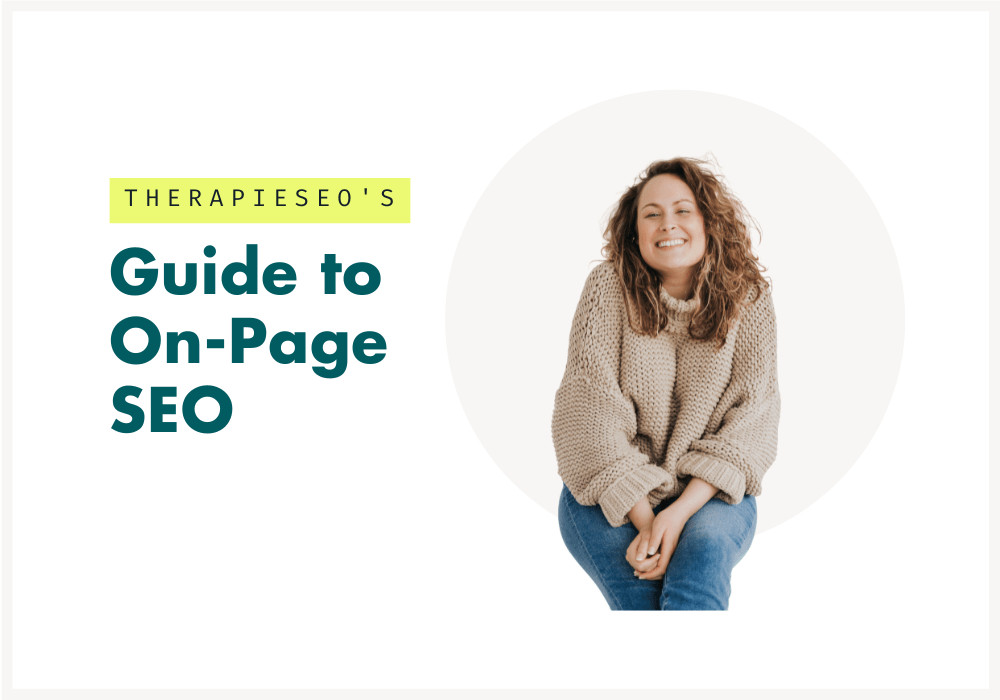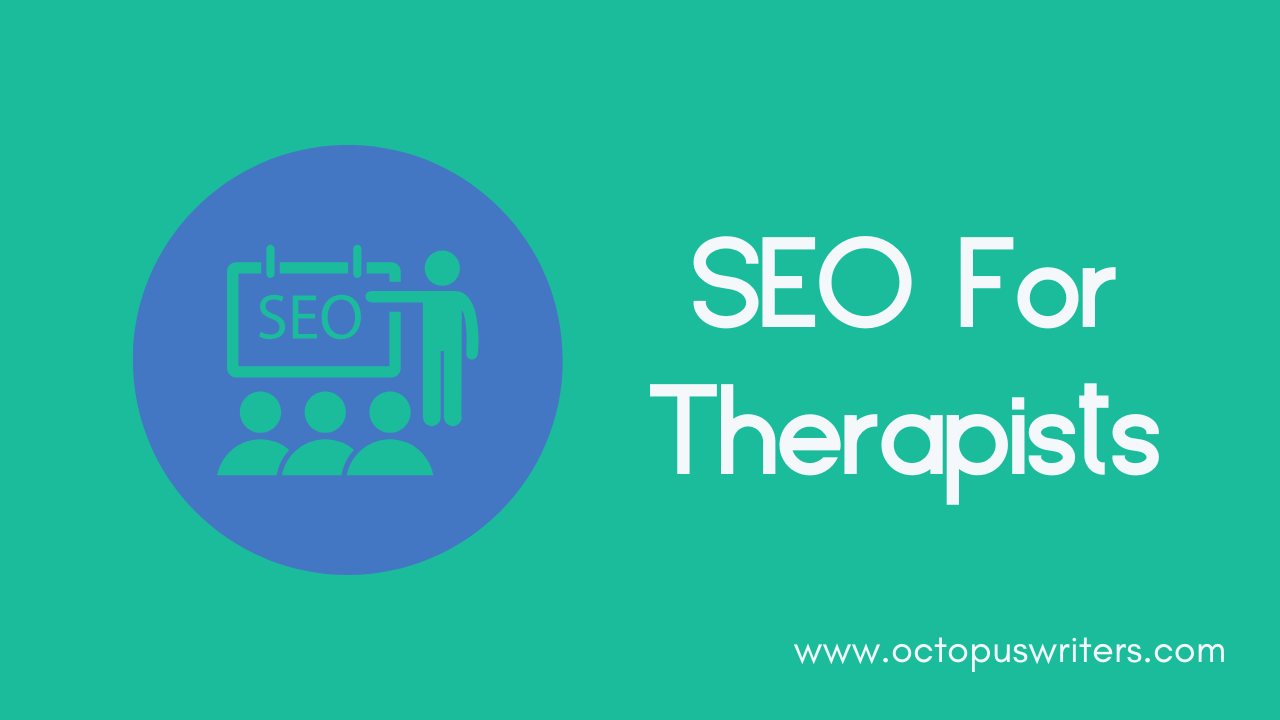In the competitive world of therapy services, SEO for therapists is crucial for getting your practice noticed. As more people rely on search engines to find local therapists, it’s essential to ensure your website is optimized to appear in search results. SEO helps you rank higher, allowing potential clients to discover your services easily. By focusing on key factors like local SEO, keyword optimization, and creating valuable content, you can attract the right audience and establish your therapy practice as a trusted resource online.
In this article, OctopusWriters will walk you through the steps of implementing effective SEO for your therapy practice. From crafting engaging content and building backlinks to ensuring your website is mobile-friendly, we’ll cover everything you need to know to boost your online presence. If you’re wondering how SEO can help you attract more clients and grow your practice, read on for valuable tips and strategies that will take your practice’s online visibility to the next level.
What Is Seo For Therapists?
SEO (Search Engine Optimization) is a digital marketing technique that makes your therapy website easier to find on search engines like Google. For therapists, SEO offers a way to reach potential clients, build credibility, and expand practice reach. SEO involves four main areas:
- Local SEO: Focused on improving your presence in local searches through Google My Business optimization, local keywords, and client reviews.
- On-Page SEO: Involves optimizing internal site elements such as title tags, meta descriptions, content, keywords, and images to boost relevance.
- Off-Page SEO: Builds authority through backlinks, social shares, and guest blogging, helping increase search rankings.
- Technical SEO: Encompasses page speed, HTTPS, sitemaps, mobile-friendliness, URL structure, and internal linking, creating a technically strong site.

In short, SEO for therapists means refining your website to ensure clients can find you when they need support. SEO helps bridge the gap between your services and clients, making your practice an accessible choice online.
Why Is It Important?
In today’s digital world, most people rely on search engines like Google to find therapy services. If your website does not appear on the first page of Google search results, you are nearly invisible to potential clients. In fact, only 0.44 percent of users ever check the second page.
Implementing SEO for therapists ensures your website does not get lost in the vast digital space. Instead, it places your therapy or counseling services directly in front of clients actively seeking the help you provide.
Benefits Of Seo For Therapists
Now that OctopusWriters has explained the essentials of SEO for therapists, let’s examine how it can enhance your practice and bring value to your patients.
Generate Online Awareness For Your Practice
As most people focus on the first page of search results, sites appearing there receive a far higher number of clicks than those on later pages. Without a spot on that first page, your site might go unnoticed by potential clients. SEO can be a powerful approach to getting your site onto the first page, building awareness and attracting clients to your practice.
Attract Your Ideal Patients
While appearing at the top of search results for a general keyword like ‘therapy’ can bring in a lot of visitors, most of them may not take the next step to become clients. Through SEO, you can focus on specific therapy-related terms that match your expertise, drawing ideal patients to your site with content tailored to their needs.
Build Authority Online
Google ranks websites based on several factors, with ‘helpfulness’ being one of the most crucial. Through SEO for therapists, you’re creating high-quality, informative content that draws in clients. The more people engage with this content, the more it signals to Google that your site is trustworthy and useful, which can boost your rankings.”

This SEO content not only educates prospective clients on mental health topics but also provides insights into your practice, helping them feel confident in choosing you as their therapist.
All About Keywords For Therapists
Keywords are the foundation of SEO for counselors, psychologists, and psychiatrists. Identifying relevant keywords that potential clients are searching for allows you to strengthen your SEO strategy.
We recommend using longer and more specific keywords. Why? These specific phrases indicate that the searcher knows exactly what they want and may be ready to reach out.
For example, ‘therapist’ is a broad keyword. If you search for ‘therapist’ on Google, you will find a mix of results such as articles on the career path, therapist salaries, and listings on Psychology Today. This range suggests that Google is unsure of the searcher’s intent.
However, a search for ‘therapist for anxiety in Tucson Arizona’ brings up focused results for anxiety therapists in Tucson. This type of searcher has a clear need and is likely to convert into a client. Specific keywords like these are not only more targeted but are also often easier to rank for.
Neglecting to use specific keywords is just one of many mistakes people make in keyword research. For additional insights, take a look at our post on four common keyword research mistakes therapists often make.
11 Step Guide For Therapist Seo Summary
Conducting Keyword Research
At OctopusWriters, we recognize the importance of keyword research as the foundation of any effective SEO strategy for mental health professionals. It is a core step that informs all your optimization efforts.
By understanding the keywords your target clients use, you can create high-ranking content that targets these terms and offers valuable information. This makes it more likely that potential clients will reach out to you for your services.
For therapists, the keyword research process involves:
- Identifying relevant keywords and topics tied to your services and expertise
- Developing informative, helpful content that speaks directly to these topics and keywords
Examples of valuable keywords and topics for therapists include specific therapy offerings, the locations you serve, actionable mental health advice based on your field, and useful statistics or facts.
How to Conduct Keyword Research
Keyword research is fundamental to strengthening your practice’s online presence. Here are some effective techniques to find the most relevant and impactful keywords for your practice:
- Understand Search Intent: Focus on the purpose behind the keywords you’re targeting and create content that aligns with this intent. This approach helps you reach your target audience and boosts user engagement.
- Prioritize Long-Tail Keywords: These longer, more specific keywords often have lower search volume but higher conversion rates. Adding them to your site copy can attract a focused audience, increase relevant traffic, and enhance your ranking potential.
- Balance Keyword Difficulty and Search Volume: While it’s essential to consider keywords with high search volume, also keep keyword difficulty in mind. Finding a balance between volume and competition can lead to more successful SEO outcomes.
- Utilize Google Autocomplete: Google’s autocomplete feature provides valuable keyword ideas by showing related search terms users often look for. These suggestions can guide you in creating content that addresses common questions and topics relevant to your ideal clients.
- Update and Expand Your Keyword List: Revisit your keyword list periodically to account for changes in search trends. Staying current ensures your keyword strategy remains effective.
- Optimize for Voice Search: As voice search grows in popularity, including conversational keywords that mirror natural speech patterns can help you connect with voice search users and enhance your strategy.
- Leverage Google Trends: Google Trends helps you track seasonal and emerging topics in your field. Incorporating trending keywords into your content can capture new search interest and boost your rankings.
- Monitor Keyword Performance: Use tools like Google Analytics and Search Console to regularly track keyword performance. This allows you to identify high-performing terms and refine your strategy for better results.

Effective Keywords for Therapists
Consider these potential keywords for therapists:
- Cognitive Behavioral Therapy (CBT)
- Dialectical Behavior Therapy (DBT)
- Play Therapy for Children
- Teen Therapy
- Couples Counseling
- EMDR Therapy
It’s helpful to organize keywords based on their type: local, low competition, and high competition:
- Local Keywords: These are terms that ideal clients use when searching for nearby therapists, like “therapist in [area]” or “couples counseling in [area].” You can optimize for these by creating location-specific pages on your site with titles, headers, and content that include the location.
- Low Competition Keywords: Focus on specific phrases (4-5 words) that face less competition, such as “therapist for teens with ADHD” or “depression counseling covered by insurance.” These keywords can help drive targeted traffic and improve conversion rates.
- High Competition Keywords: Broader terms like “therapist,” “psychologist,” or “anxiety therapy” often have higher search volumes and more competition, but they can bring significant traffic to your site.
Strategies to Rank for High-Competition Keywords
To rank for highly competitive terms, focus on creating content around related topics with lower competition, and link this content to your main pages. Over time, this builds a topic cluster, helping establish your authority on the subject.
Leverage free tools like Google Keyword Planner, Search Console, and Google Trends for keyword research and analysis. These tools can help guide your SEO efforts and reveal valuable keywords and opportunities. By implementing a thorough keyword research strategy, you’ll be able to create content that attracts higher-quality traffic and leads to more client bookings.
Crafting Engaging & Relevant Content
Publishing engaging, high-quality content that’s relevant to your audience is an essential part of SEO for therapists. This helps attract new clients and improve your search engine rankings.
Regularly producing and updating content that connects with your target audience enhances your online presence, establishing you as a leading resource in the field.
Tips for Creating Engaging SEO Content
With SEO for therapists, you can build a strong online presence by providing content that meets the needs of your ideal clients. Here are practical strategies to help you create content that drives engagement and improves visibility:
- Offer diverse content types: In SEO for therapists, creating a mix of content—such as service pages, FAQs, location-specific pages, blog posts, videos, and interactive content—can help you reach different segments of your audience.
- Optimize with search intent in mind: Use relevant keywords in title tags, meta descriptions, headers, and image alt tags. Focusing on search intent allows you to create content that aligns with what your audience is looking for, improving its chances of ranking well.
- Apply E-E-A-T guidelines: Following Google’s E-E-A-T standards (Experience, Expertise, Authoritativeness, Trustworthiness) is vital in SEO for therapists. By demonstrating your expertise and providing reliable information, you enhance your credibility and ranking potential.
- Stay consistent: A steady content schedule is essential for SEO for therapists. Aim to publish new content weekly and refresh older content to keep your site relevant, boosting audience engagement.
- Address client needs: Focus on the topics and questions that matter most to your clients. Providing actionable insights and advice strengthens your reputation and positions you as a go-to resource.
- Monitor content performance: Use analytics to see which pieces resonate with your audience. This insight helps you refine your SEO for therapists strategy and produce more of the content that drives engagement.
E-E-A-T (Experience, Expertise, Authoritativeness, Trustworthiness)
Using the E-E-A-T principles (Experience, Expertise, Authoritativeness, Trustworthiness) in content creation according to Google’s Quality Raters’ Guidelines can increase your site’s credibility and boost its ranking potential in search engine results pages.
Google added the ‘Experience’ component in late 2022, confirming that E-A-T is considered for every search query. This E-E-A-T framework is fully detailed in Google’s Quality Raters’ Guidelines. The strategies above mainly focus on on-page SEO, which involves optimizing various elements on your website like text, images, meta tags, and links to drive traffic and improve search rankings.

In comparison, off-page SEO involves activities outside your website that support search engine rankings.By consistently producing relevant, engaging content tailored to your therapy practice and client needs, you will draw more ideal clients from search engines.
Optimizing Content & Keyword Usage
Using keywords effectively is essential for improving your practice’s visibility in search engine results. By integrating well-researched and relevant keywords throughout your content, you can attract more ideal clients who are searching for your type of practice and services in your service areas.
Strategies for Optimizing Keywords and On-Page SEO
To fully leverage your keyword strategy and on-page SEO for therapists, consider implementing the following tips to optimize your content, rank better in search results, and connect with your ideal clients:
- Incorporate keywords into key elements: Make sure to include your researched keywords in vital components such as the title, meta description, headers, subheadings, and body text. This helps search engines understand the subject of your page, which can enhance its ranking.
- Create detailed content: Produce comprehensive and insightful content related to your target keywords that exceeds the quality of existing high-ranking pages. This approach increases your likelihood of achieving a higher position on Google search results.
- Steer clear of keyword stuffing: Use keywords in a natural manner throughout your website content, avoiding overuse. Keyword stuffing can appear spammy and may negatively impact your SEO rankings and overall website visibility.
- Evaluate competitors: Investigate the pages currently ranking for your target keywords and pinpoint any content gaps. By filling these gaps with valuable information, you can make your content stand out and improve its ranking on Google and other search engines.
- Optimize for long-tail keywords: Include long-tail keywords, which are typically longer and more specific phrases, in your content. While these keywords may have lower search volumes, they often lead to higher conversion rates due to their precision.
- Utilize internal linking: Connect related pages within your site using internal links. This practice aids search engines in understanding the context and relationships between topics, which is crucial for improving search rankings. Internal links also promote further exploration of your site by visitors, enhancing engagement and SEO performance.
By following these strategies for keyword optimization, you can effectively enhance your website’s SEO performance, reach a broader target audience, and expand your practice.
Enhancing Images For Search Engines
Optimizing images effectively is crucial for enhancing both your SEO and your site’s user experience. Well-optimized images can appear in search results like Google Images, increasing your site’s visibility.
How to Optimize Your Images for SEO
High-quality, optimized images not only have the potential to appear in search results but also contribute to your site’s overall performance. Here are some proven strategies to help you optimize your images for both users and search engines:
- Compress and Resize Images: Before uploading images to your site, ensure they are properly compressed and resized to the required dimensions. Properly sized images improve site speed, which is essential for SEO. Tools like Microsoft Paint or macOS Preview can resize images, while online services like TinyPNG can compress images without significant loss of quality.
- Optimize File Names: Use descriptive, keyword-rich file names for your images. This helps search engines understand the content of the image and the associated web page. Including relevant keywords can improve your visibility in image search results like Google Images.
- Add Alt Text and Title Tags: Provide relevant keywords in your image alt text and title tags to describe the image content. This offers additional context for search engines and assists visually impaired users who rely on screen readers.
- Use Responsive Images: Implement responsive images using the HTML <source> attribute to serve appropriately sized images based on the user’s device. This ensures faster loading times and a better user experience, which is vital for SEO. Many website builders like WordPress, Wix, and Squarespace automatically handle this for you.
- Organize Images with Galleries or Slideshows: For pages with multiple images or blog pages showcasing various categories, consider using galleries or slideshows. This organizes images in a visually appealing manner, improving user experience and keeping visitors engaged with your content.
- Implement Lazy Loading: Use lazy loading techniques to load images only when they are about to enter the user’s viewport. This can significantly improve your site’s loading time, especially on pages with numerous images. For WordPress sites, plugins are available to help you implement lazy loading.
By incorporating these image optimization strategies, you can enhance your site’s performance, improve user experience, and increase visibility in search results. This, in turn, will contribute to the overall growth of your private practice through improved SEO
Link Building For More Traffic & Visibility
Link building plays a vital role in SEO for therapists. It involves obtaining backlinks from authoritative mental health or therapy websites, linking out to relevant external sources, and establishing internal links between your own website’s pages.
Search engines rely on these links to determine your content’s authority and relevance, helping boost its ranking potential. To make the most of link building, focus on crafting valuable content that others will want to link to and share.
Types of content that naturally attract backlinks and drive traffic include:
- Insightful blog posts on mental health
- Infographics about therapy concepts or mental health statistics
- Videos with therapy techniques or mental health advice
- Podcasts featuring expert interviews or personal stories
Boost Your Link-Building Efforts
At OctopusWriters, we recommend a well-rounded approach to link building, combining multiple strategies. By creating high-quality content, networking within the mental health community, and leveraging available tools, you can build a strong backlink profile that enhances your practice’s online visibility and credibility.
Here are key strategies to improve your link building:
- Identify Potential Links: Look for websites in the mental health or therapy niche with potential backlink opportunities. Focus on quality by targeting strong, reputable sites rather than aiming for large quantities from low-quality sources.
- Build Connections: Engage with influential figures in the therapy field by interacting with their content and sharing your insights. Networking can lead to guest post opportunities, collaborations, or social media shoutouts, generating valuable backlinks.
- Leverage Resource Pages: Reach out to sites with resource pages or directories related to mental health or therapy to request a listing. This can yield high-quality backlinks and increase referral traffic.
- Use Internal Linking: Strengthen your site’s structure with internal links between relevant pages. This distributes link equity and guides users to related content, improving both SEO and user experience.
- Monitor Link-Building Progress: Use an SEO platform like OctopusWriters to regularly assess your link-building efforts. Analyze your backlink profile, find areas for improvement, and adjust your strategy as needed.
Link building is a long-term strategy. By staying consistent, creating high-quality content, and fostering relationships within your niche, you can maximize the benefits of your link-building efforts.
Site Structure To Improve Ux & Seo
When you start publishing pages and blog posts, ensure that your site is structured and easy to navigate, so visitors can quickly find what they’re looking for.
A clear site structure is a vital part of technical SEO, as it helps search engines understand the organization and connections within your content.
How to Develop a Strong Site Structure
To build a site structure that benefits both users and search engines, consider these best practices. These steps will help you create a well-organized, user-friendly site that also enhances your SEO performance:
- Design a straightforward navigation menu: A clear navigation menu enables users to explore your site easily and find the information they need with minimal effort.
- Implement a full sitemap: A sitemap lists all pages and posts, making it easier for search engines to crawl and index your site.
- Incorporate internal links: Guide users to related content within your site through internal links. This approach enhances user experience and helps search engines understand the relationship between your pages.
- Use categories and tags to organize content: For blog posts, categorize and tag content to group similar topics, making it easier for users and search engines to navigate and understand your site.
- Optimize title tags, headers, and meta descriptions: Ensure each page has unique title tags, headers, and meta descriptions to prevent confusion and improve SEO performance on search engine results pages.
By following these best practices, you’ll create a structured, user-friendly website that improves both SEO and user experience, helping you reach more potential clients and grow your mental health practice.
Ensuring Mobile-Friendliness
Making your website mobile-friendly is essential, as more people are using smartphones and tablets to search for therapists and mental health services.

Since Google considers mobile-friendliness a key ranking factor, it’s crucial to select a mobile-responsive theme or website builder and ensure a smooth user experience across both desktop and mobile devices.
Steps to Optimize Your Website for Mobile-Friendliness
With the increase in mobile searches for mental health professionals, it’s important to ensure your website looks and functions well on all devices. Here’s how to make your site mobile-friendly:
- Choose a responsive design or builder: A responsive design automatically adapts your site’s layout to fit various screen sizes, providing a consistent experience across devices.
- Use Google’s Mobile-Friendly Test Tool: This tool evaluates how well your pages display on mobile and flags any issues impacting loading. Testing regularly helps you maintain and improve mobile compatibility.
- Select responsive WordPress themes and plugins: If you use WordPress, choose a responsive theme and plugins to create a flexible design that works smoothly on all devices, which is beneficial for both users and Google.
- Focus on usability: Make sure your site is easy to navigate on mobile, with readable text, touch-friendly buttons, and a clean layout.
Optimizing your site for mobile improves usability and boosts its potential ranking on Google’s search results pages, helping you reach more potential clients and grow your therapy practice.
Mastering Local Seo Strategy
Local SEO for therapists is essential if your practice serves clients within a particular geographic area. With an effective local SEO strategy, you can increase your online visibility, attract more nearby clients, and enhance your practice’s credibility locally and online.
Local SEO for Therapists
To succeed with local SEO for therapists, it is important to combine different strategies. The goal is to optimize your presence across various online channels to make sure your practice appears consistently in local search results.
- Include local keywords: Be sure to add your city, state, and relevant keywords related to your therapy practice on your website. Use a keyword research tool to find valuable local keywords that match search demand and incorporate them into your content.
- Set up a Google Business Profile: Create a Google Business Profile, formerly known as Google My Business, to expand your online presence. This profile allows your practice information and reviews to appear in local search results whenever people in your area search for your services.
- Add listings in directories: List your practice on therapy directories and popular local sites like Psychology Today, Bing Places for Business, Yelp, Yellow Pages, and Apple Maps. Consistent and accurate information across these directories can boost your visibility in search results.
- Create local content: Publish content about the area you serve to help potential clients understand whether your practice is the right fit for them. Localized content can also make your site more relevant for local searches.
- Engage on social media: Use social media platforms such as Facebook, Twitter, and LinkedIn to connect with local audiences. Share content focused on your area, participate in community groups, and engage with your local audience to increase your presence.
- Request online reviews: Encourage satisfied clients to leave reviews on Google, Yelp, and therapy-specific directories. Positive reviews can strengthen your credibility and improve your visibility in local searches.
- Optimize for voice search: To capture voice search users, use conversational language and long-tail keywords in your content, as these are often used by people seeking local mental health services through voice assistants.
- Participate in community events: Engage with your local community by attending or sponsoring events, workshops, or webinars related to mental health. These activities help build relationships, enhance brand awareness, and may lead to backlinks from local websites or media sources.
Using these local SEO for therapists strategies, including local content creation, directory listings, and gaining positive reviews, will help you reach a broader local audience and increase your visibility in Google Search and Google Maps.
Promoting Content Effectively
In the digital world, there are many ways to promote your content and enhance your SEO. With OctopusWriters, we focus on helping you connect with your audience across multiple channels to expand your online reach and grow your mental health practice.
How to Promote Content and Boost SEO
OctopusWriters recommends these proven tactics to promote your content while enhancing SEO:
- Leverage diverse social media platforms: Set up profiles on Facebook, Twitter, Instagram, and LinkedIn. Tailor content to each platform’s audience to maximize engagement and reach.
- Send regular email newsletters: Keep your audience engaged by sharing updates, new content, or promotions. Email newsletters not only drive traffic but also nurture relationships with potential clients.
- Host online events: Organize webinars, workshops, or live Q&A sessions to attract new clients, establish your brand, and share expertise.
- Collaborate with mental health influencers: Partner with influencers to create joint content, such as guest blogs or podcasts. This can expand your reach and bring in high-quality backlinks.
- Join online communities: Engage in forums, social media groups, or discussion boards where your audience is active. Share valuable insights and content to build credibility in the mental health field.
- Invest in paid advertising: Consider using Google Ads or social media ads to increase reach. Targeting specific audiences can help connect you with potential clients.
- Optimize content for search engines and social sharing: Use relevant keywords, meta tags, and headers to make your content search-friendly. Add share buttons and engaging visuals to encourage social sharing.
- Track performance: Monitor your content’s progress with tools like Google Analytics and social media insights. Refine your strategy based on data to improve effectiveness.
OctopusWriters believes that with these strategies, you can enhance your online presence, attract more clients, and improve SEO for long-term growth.
Encouraging Positive Online Reviews
Positive online reviews can greatly enhance the credibility of your practice and build trust with potential clients. By collecting and showcasing reviews, you can improve your SEO, strengthen your online presence, and attract more clients.
How to Encourage Positive Reviews and Boost Your SEO
Here are ways to use online reviews to enhance your therapy SEO:
- Showcase reviews on your website: Displaying client reviews on your site adds credibility and reassures potential clients about the quality of your services. Featuring positive feedback can leave a great impression, underscoring your commitment to client satisfaction and professional excellence.
- Respond to reviews professionally: Respond promptly to reviews to show potential clients that your practice is engaged and values client feedback. As a therapist, it is important to uphold ethical standards by avoiding any disclosure of client-specific information. Keep responses professional and confidential.
- Focus on Google reviews: Since Google is the top search engine, Google reviews significantly influence your online visibility. Encouraging and displaying Google reviews can enhance your search presence and attract more clients.
- Optimize review management: Use tools like Google Business Profile to manage, monitor, and respond to reviews efficiently. These tools make it easy to track feedback, measure client satisfaction, and adjust business strategies as needed.
- Share reviews on social media: Highlight positive reviews on your social media platforms to build brand trust and connect with your audience. Be sure to protect client privacy by removing any identifying details. Respecting privacy while sharing positive feedback is key to maintaining professionalism.
Sharing anonymous, positive reviews can help establish trust with potential clients, demonstrate the value of your services, improve SEO, and attract more clients. Just remember to adhere to professional ethics and platform guidelines when sharing reviews.
Leveraging Analytics & Trend Analysis
In the dynamic world of SEO, regularly assessing your website’s performance and keeping up with evolving trends is key to achieving long-term success. By tapping into analytics tools and trend analysis, you can make data-driven adjustments that strengthen your practice’s online visibility and keep you a step ahead.
How to Use Analytics and Trend Analysis to Improve SEO
Understanding the impact of your SEO strategies and adapting to new trends is essential for therapists aiming to enhance their online presence. Here are some ways to use analytics and trend analysis to optimize your site’s performance:
- Leverage Google Analytics: Set up a Google Analytics account to track crucial metrics like visitor numbers, your most popular pages, and conversion actions (e.g., calls or form submissions). This data helps you identify strengths and areas where your site could be improved.
- Monitor search rankings: Keep an eye on your website’s search engine rankings to spot changes or shifts. By analyzing keyword ranking trends, you can make smart adjustments to maintain or improve your position in search results.
- Follow keyword and topic trends: Stay updated on the latest trends in keywords and topics related to your practice. Regularly refreshing your content to reflect current trends can give you a competitive edge and help you deliver timely, relevant information to clients.
- Evaluate competitor performance: Study your competitors’ SEO strategies and content to uncover opportunities for differentiation or areas where you can enhance your own approach. Competitive analysis is invaluable in standing out within the therapy field.
- Analyze user engagement: Look at data like bounce rates, time on page, and click-through rates to gauge the effectiveness of your content and site layout. These insights can help you optimize the user experience and overall site functionality.
By consistently using analytics and trend analysis, you’ll be well-equipped to refine your SEO approach, attract more clients, and strengthen your practice’s online visibility.
Local Seo For Therapist
Local SEO is much like traditional SEO, but it aims specifically at Google’s local search results rather than general search listings. A key asset in local SEO is your Google Business listing, which is free to claim. If you have not already claimed it, doing so is highly recommended.

It is important to note that virtual therapists may face challenges in verifying a Google Business listing, as Google requires the location to be a physical place where clients are seen. While we offer some alternative approaches to assist our clients with this process, success is not always guaranteed.
How Therapy Seekers Find You Online
When someone in your area looks for a therapist, they’re likely to search for terms like “anxiety therapist near me” or “couples counseling [your city]” on their phone or computer. This is where local SEO becomes essential for your practice.
Local SEO for therapists is all about optimizing your online presence so your practice appears in these location-specific searches. It’s about making sure that search engines identify your website as a relevant resource for people seeking therapy in your area.
Here’s how local SEO works:
Search engines consider several factors when ranking websites in local searches. Key elements include the consistency of your business’s Name, Address, and Phone number (NAP) across online directories, the presence of positive reviews, and how relevant your website content is to local search terms.
By implementing effective local SEO strategies, you signal to search engines that your practice is tailored to serve clients in your community. This increases the likelihood of your website appearing in the local search results, particularly in the “Map Pack”—the results displayed above the standard organic listings.
In simple terms, local SEO is like putting up a neon sign in the digital world that says, “Therapist serving [your area].” This makes it easy for potential clients searching for help to find your practice.
Improving Local Seo For Therapists
Local SEO for therapists is all about making sure your online presence is optimized for local searches. In simple terms, it ensures that people in your area can easily find your practice when they search for therapy services online.
If you provide in-person therapy, it’s essential to focus on local SEO by optimizing your website and business listings to include location-based details.
Ways to improve local SEO:
- Claim and Optimize Your Google My Business Profile: Ensure you claim your Google My Business profile and optimize it to appear in the local search pack on Google Maps. It’s also important to list your practice on other relevant local directories to increase your visibility across the web.
- Consistency in NAP (Name, Address, Phone Number): Make sure that your Name, Address, and Phone Number (NAP) are consistent across all online directories, such as Yelp or Yellow Pages. This helps search engines verify your practice and improve its credibility.
- Use Location-Specific Keywords: Incorporate geographic terms into your content, including title tags, meta descriptions, and headers. This tells search engines which areas you serve and helps attract local clients who are searching for services in their location.
- Encourage Client Reviews: Invite satisfied clients to leave positive reviews on Google, Facebook, or Trustpilot. Good reviews build trust and positively influence search engine rankings, which helps you attract more local clients.
- Create Localized Content: Develop content that specifically targets the needs of people in your area. For instance, writing a blog post titled “Best Therapist in [City]” can drive more local traffic to your website and increase your practice’s visibility.
By implementing these local SEO strategies, you can make sure that your practice shows up in local search results and is easily found by potential clients near you.
On-Page Seo For Therapist
Most of the time, discussions around website optimization focus on On-Page SEO. This is all about refining the visible parts of a site that therapists and their clients see, like the main page text and other content.
The Meta Title Tag
The title tag is a critical signal that therapists can use to help Google understand what their article is about.
If you’re using WordPress with the OctopusWriters SEO plugin, much of this work is handled for you. WordPress will take your article’s title and automatically assign it to the title tag. If you’re not using this plugin, you can locate the title tag within the head section of your website’s code, enclosed by <title> tags. To optimize the title tag, include keywords you want to rank for, but make sure they fit naturally within the title. The title should feel coherent and meaningful.
Here’s an example using the keyword “Chicago Therapist”:
Effective Title: Overcoming Public Speaking Anxiety – 5 Tips from a Chicago Therapist. This specific title reads smoothly and naturally incorporates the primary keyword. Remember, even a basic title is better than no title at all, so use the title tag on each page and post, ensuring each one is unique. Using the same title tag across multiple pages won’t provide Google with helpful information about what makes each page’s content unique.
Crafting an effective Meta Title is essential for boosting your page’s visibility and SEO. Here are three tips to help you create an impactful Meta Title:
- Limit it to 70 characters: Keep your Meta Title at 70 characters or fewer, as this is the maximum number Google will display. Staying within this limit ensures your title won’t be cut off in search results.
- Describe the page content specifically: Instead of using a generic Meta Title with only your business name and location, make it specific to the page. A descriptive Meta Title helps users and Google understand what the page is about, making it more likely to attract relevant clicks.
- Include focus keyword, location, and business name: Use the page’s focus keyword at the beginning, followed by your location if relevant, and add your business name if it fits naturally. For example, if the page is about couples therapy, start with “couples therapy,” then add your location and business name if there’s room.
The Description Tag
The description tag, found in the head section of a webpage, is a crucial element for on-page optimization. It’s the snippet of text that appears beneath the title in search results. You can choose to leave this tag blank and let Google decide, or you can create a few engaging lines to entice visitors to click your link.

Your page description should consist of one or two sentences that summarize the core message of your post, using language distinct from the page’s main content.
Crafting a strong Meta Description is essential to attracting clicks and improving your page’s SEO. Here are three tips to help you write an effective Meta Description:
- Keep it to 155 characters or fewer: Google displays up to 155 characters, so make sure your Meta Description fits within this limit. Anything longer may be cut off in search results.
- Provide a concise page summary: Rather than general information about your practice, location, or credentials, use the Meta Description to summarize what this specific page is about. This helps searchers know exactly what to expect.
- Engage potential clients: Write the Meta Description with the reader in mind, not just for Google. Make it intriguing and inviting, encouraging readers to click through to learn more about how you can support their needs.
Content
At OctopusWriters, we believe that to achieve high rankings, your content needs to be the most valuable resource for your chosen keyword. Earlier, we provided tips on how to create top-notch content that stands out in search results.
We recommend publishing high-quality, relevant content on your website at least once a month. Blogging is an effective way to keep your site fresh and engaging, allowing you to address topics that matter to your audience and strengthen your online presence.
Images
Be sure to include plenty of images in your content. As we’ve discussed, images are helpful for keyword optimization and also make the text more visually appealing by breaking it up for easier reading. When creating content for your website, readability is crucial. Writing at a 6th-grade reading level is recommended, meaning you should avoid industry jargon, keep vocabulary simple, and use clear sentence structures.
Off-Page Seo For Therapist
Link Building
A key focus of Off-Page SEO is link building.
Websites rely on a system of trust, and links are a crucial way to establish that trust. Generally, the more links a website has, the more reliable Google considers it, which can lead to higher rankings in search results.
How can therapists attract links to their website?
In addition to creating valuable content that naturally gains links, therapists can actively work on link building by:
- Listing their website in local directories (this is particularly important—add your listing wherever possible, such as Yelp, local chambers of commerce, newspapers, etc.).
- Registering on national directories like Psychology Today.
- Writing guest posts for other websites.
Building links takes time. It’s helpful to work on it gradually, so therapists can avoid feeling overwhelmed. SEO can seem daunting at first, but therapists shouldn’t stress. Like any new skill, it’s all about learning as you go. With patience and the right approach, SEO can deliver real benefits: connecting therapists with those who are looking for their services.
How To Get Backlinks
Ideally, backlinks would accumulate naturally as a reflection of a great reputation and professional involvement.
But the online world doesn’t always match reality, so if you want to speed up the process, you can actively build links yourself (or hire a service like ours to handle your SEO).
Here are a few types of links we help our clients build (or guide our therapist clients toward in our online SEO program, Optimize Your Practice):
- Podcasts: Or any type of speaking engagement, really. Appearing as a guest on a podcast doesn’t always guarantee a backlink, but it can offer valuable brand exposure, mentions, and even “implied links,” which can enhance your online authority.
- Directories: Not only therapist directories. While these directories help with implied links, they’re not always recognized by SEO tools, and Google gives more weight to unique links that are harder to obtain. Consider other niche directories, like Best Therapists for private-pay therapists, or local listings like Yellow Pages.
- Help a Reporter Out (HARO): HARO is a great platform for connecting with journalists looking for expert quotes. By submitting responses, you could see mentions in publications like Cosmo and HuffPost. Our clients gain access to our HARO template, submission tips, and a curated database of relevant journalist requests.
- Guest Posting: Publishing content on other websites with a link back to your site is another effective way to gain high-quality backlinks.
There are many other link-building strategies out there, but these four provide a solid starting point for therapists aiming to strengthen their online presence.
Technical Seo For Therapist
Technical SEO is all about managing the technical aspects of a website to ensure it meets ranking requirements. It starts with ensuring Google can find a therapist’s site and continues with regular adjustments to keep the site performing optimally.
Easy Architecture
Good websites are designed to be easy to navigate, so visitors can access any content they need with only a few clicks. This simplicity in navigation is essential both for user experience and for SEO, as it allows search engines to better understand and rank the site.
In web development, design typically refers to the visual appeal, while architecture focuses on the site’s structural layout. Site Architecture serves as the foundation, like a skeleton, with the design as the outer “look and feel.” In technical SEO, planning this structure before the website goes live is ideal, making it easier to optimize and maintain over time. Redesigning an existing site’s architecture can be challenging, so early planning is key.
Indexed
For therapists’ websites to be found in search results, Google first has to find and index them. Sounds simple, but it’s important. To check if a website is indexed, just type the URL into Google’s search bar. If it shows up, it’s indexed! If it doesn’t appear, there might be an issue. Keep in mind that new websites may take a few days to appear in Google’s index.
Possible reasons a site may not be indexed:
- Duplicate content on the site
- Robots.txt blocking the site
- Missing sitemap.xml
- Crawl errors
Therapists can use Google Search Console to request indexing if their site isn’t displaying in search results. I’ve also written about how Google indexes therapy websites in another post. Additionally, Google Search Console is a good place to check for crawl errors that need to be addressed.
Url Structure
A clear, simple URL structure is essential for both SEO and user experience. For example, a well-structured URL might look like [sitename].com/[post-or-page-title]. This format is straightforward, helping users understand what the page is about before they even click on it. Google also favors clean URLs, as they make it easier to interpret and categorize content.

Therapists should ensure that their website URLs follow a similar structure. A clean URL improves site navigation, can increase click-through rates, and provides a small SEO boost. Issues often arise when URL structure is left to default settings. URLs can end up cluttered with numbers or symbols, making them harder to read, unless they are customized.Once a URL has been set and indexed, it’s generally best to leave it as is. Changing a URL later can affect indexing and may lead to broken links if not managed properly.
Page Speed
Page speed plays a vital role for therapists aiming to improve their rankings on search engines. If a website loads slowly, it is less likely to rank well, while faster sites tend to perform better. Think of page speed as a competitive advantage, the quicker the site loads, the stronger its position. Therapists can check their site’s speed by visiting Google’s Pagespeed Insights and entering the URL.
Common factors that slow down a site include:
- Large images
- An overuse of plugins
- A complex theme
To effectively boost site speed, therapists may wish to consult a developer, as this process often involves detailed technical work.
Should Seo For Therapists Be Done Independently Or With An Agency?
At OctopusWriters, we often hear therapists wondering whether SEO for therapists is best handled independently or through a professional agency. Let’s explore the advantages and disadvantages of each approach to help you make an informed choice.
Managing SEO for Therapists Independently
Taking on SEO for therapists independently offers freedom and may be more cost-effective, but it does present certain challenges. Here is a look at the pros and cons:
Pros of Independent SEO:
- Cost Savings: For therapists just starting out, managing SEO on your own can reduce expenses and allow you to allocate funds to other areas of your business.
- Total Control Over Content and Strategy: Handling SEO independently means you have complete control over each detail, from keyword selection to the tone of your content. This can lead to a highly personalized website that truly reflects your practice.
- Building Valuable Skills: By managing SEO independently, you gain a firsthand understanding of how it works, a skill that is increasingly valuable in the digital world. Using tools like Google Analytics and Google Search Console can also help you understand and improve your site’s performance.
Cons of Independent SEO:
- Time Commitment: SEO requires a significant time investment, especially if you are learning as you go. Time spent on SEO may reduce the time available for client care and other critical tasks.
- Complex Learning Curve: SEO combines both technical and creative elements, such as link building, competitive analysis, and content optimization. Mastering these areas without guidance can take considerable time.
- Slower Results: The process of trial and error often means slower results for those who are new to SEO. With constant changes in Google’s algorithms, staying updated and adjusting strategies can be difficult without professional support.
Working with an SEO Agency
Opting to work with an SEO agency like OctopusWriters provides the benefit of professional expertise and can lead to faster, more reliable results. Here is a look at the pros and cons of choosing this path:
Pros of Using an SEO Agency:
- Professional Expertise and Tools: An agency offers expert knowledge and specialized tools tailored to therapists’ unique needs. At OctopusWriters, we cover every aspect of SEO, from keyword optimization to advanced technical adjustments.
- Time Savings and Efficiency: Partnering with an agency frees up your time, allowing you to focus on clients and practice management while experts handle your site’s optimization. The process is efficient, and results are achieved without the typical trial and error.
- Faster and More Consistent Results: SEO agencies have proven strategies for achieving faster results, helping you reach clients sooner. With a structured approach, agencies can help therapists see improved rankings and inquiries from new clients.
- Adaptation to Algorithm Changes: Google’s frequent updates to its algorithms can impact site rankings. SEO agencies stay current with these changes and quickly adjust their approach to ensure your site continues to perform well.
Cons of Using an SEO Agency:
- Financial Investment: Working with an agency requires a financial commitment, which may not be ideal for new or smaller practices. However, the return on investment from increased visibility and client acquisition often outweighs the initial cost.
- Reduced Control Over Strategy: When working with an agency, you may have less direct involvement in SEO tactics. A good agency, however, will keep you informed and include your feedback as part of the process.
We understand that managing SEO for therapists independently provides flexibility and learning opportunities but can also be time-intensive and slower to yield results. On the other hand, partnering with an agency can save time, provide expertise, and often leads to faster growth.

If you want to strengthen your online presence with SEO for therapists, OctopusWriters is here to help. Our experienced team specializes in helping therapists reach more clients through tailored SEO strategies. Reach out to us today to learn more about how we can support your practice’s growth.
Why Should Therapists Focus On Seo In 2025?
In 2025, focusing on SEO for therapists has become increasingly important. Here’s why:
- Growing Online Therapy Demand: With the rise of telehealth and virtual therapy sessions, more individuals are seeking therapy services online. SEO helps ensure that your practice appears in search results when potential clients are looking for therapists in your specialty or area. A well-optimized website helps you stand out and connect with those actively searching for help.
- Importance of Local SEO: Local searches are crucial for therapists, as many clients are looking for services in their immediate area. Optimizing for local SEO ensures that your website shows up in these specific searches. With more people using mobile devices to search for services “near me,” having a strong local SEO presence is essential for getting noticed by nearby clients.
- Long-Term Results and Sustainability: Unlike traditional ads, the impact of SEO is long-lasting. When optimized correctly, SEO continues to bring organic traffic to your website over time. Focusing on SEO for therapists provides sustainable growth, generating consistent leads and new clients without ongoing advertising expenses.
- Building Trust and Authority: Being ranked higher in search results not only increases visibility but also establishes credibility. Clients are more likely to trust and contact therapists whose websites appear at the top of search results. SEO helps ensure your content is relevant, informative, and accessible, which builds trust with potential clients.
- Staying Competitive in the Digital Age: As more therapists realize the value of SEO, it’s important to stay ahead of the competition. In 2025, therapists who invest in SEO are more likely to outshine their competitors and maintain visibility in an increasingly digital marketplace. SEO is a powerful tool to ensure that your practice stays competitive and attracts new clients.
In 2025, SEO for therapists is not just an option but a necessity for success. By investing in SEO, you can increase your practice’s visibility, reach more potential clients, and build a strong online presence that sets you apart from the competition. Now is the time to start optimizing your website for better long-term growth and success.
Frequently Asked Questions About Seo For Therapists
How long does it take to see results from SEO for therapists?
The timeline for seeing results from SEO for therapists varies, but typically it takes 3 to 6 months to see noticeable improvements in search engine rankings. SEO is a long-term strategy, and several factors influence how quickly results appear:
- Competition in Your Area: If you’re in a competitive market, such as a big city, it may take longer to rank high on search engines. More competition means more websites are vying for the same keywords, which can slow down the process.
- Website Age and Current State: If your website is new or hasn’t been optimized yet, it may take longer to establish authority with search engines. On the other hand, if your website already has some SEO practices in place, you may see improvements sooner.
- Quality of Content and Backlinks: SEO results depend heavily on the quality of your content and backlinks. If you are publishing high-quality, informative content and earning valuable backlinks, it will speed up the process.
While the waiting period can be frustrating, patience is key. Once the SEO efforts start gaining traction, the results can have a lasting impact on your visibility and client acquisition.
Can I do SEO for my therapy practice on my own?
Yes, it is absolutely possible to manage SEO for your therapy practice on your own if you’re willing to invest time and effort into learning the essentials. Here’s how you can approach it:
- Start with Education: Take time to learn the basics of SEO. There are numerous free resources available online that can guide you through the core concepts of SEO. You can read blog articles, watch tutorials, and even take online courses to understand how SEO works, what strategies you need to implement, and how to track progress.
- Leverage Free Tools: Utilize free SEO tools like Google Analytics and Google Search Console to monitor your website’s performance. These tools will give you valuable insights into how your website is performing and help you identify areas that need improvement.
- Consistency is Key: SEO requires ongoing effort. You should regularly update your website with new, relevant content, optimize existing content, and ensure that your website remains mobile-friendly and fast. Keeping up with the latest trends in SEO is crucial as algorithms change over time.
- Track and Analyze: Use tools like Google Analytics to track your website’s traffic and see which pages are performing well. Regularly monitor your rankings and adjust your strategy based on what’s working. This will help you improve your content and attract more clients.
Should I focus on SEO for my therapy website if I’m just starting out?
However, while DIY SEO is possible, it can be time-consuming. If you prefer to focus on your clients and leave SEO to professionals, hiring an SEO agency like OctopusWriters can save you time and ensure you’re using the latest strategies for optimal results. An expert agency can provide a comprehensive SEO plan and execute it efficiently, helping you achieve faster, long-lasting results.
Here’s a concise, bulleted version of the response:
- SEO helps you get found: It ensures your practice shows up in search results when potential clients are searching for therapy services in your area.
- Local SEO attracts nearby clients: Optimizing for local keywords and creating a Google My Business profile helps clients in your area easily find you.
- Long-term growth: SEO is a long-term investment that builds organic traffic and sustainable visibility over time.
- Competitive advantage: Start SEO early to outrank competitors and establish your practice as a trusted provider in your area.
- Cost-effective marketing: SEO is a more affordable, long-term strategy compared to paid ads, driving organic traffic without ongoing costs.
- Build trust and credibility: A well-optimized website builds trust with potential clients, helping you grow your client base faster.
Starting SEO early sets your therapy practice up for growth and long-term success. If you need help, OctopusWriters specializes in SEO for therapists and can optimize your website to attract more clients.
Conclusion
Incorporating SEO for therapists into your practice is no longer optional; it’s a vital strategy for staying competitive and visible in today’s digital world. By focusing on key aspects like local SEO, keyword optimization, content creation, and link building, therapists can significantly improve their online presence, attract more clients, and establish themselves as trusted professionals in their community. Whether you choose to handle SEO on your own or enlist the help of experts like OctopusWriters, investing in SEO is an investment in the long-term success of your practice. Start optimizing today and watch your practice grow with the power of effective SEO strategies.

